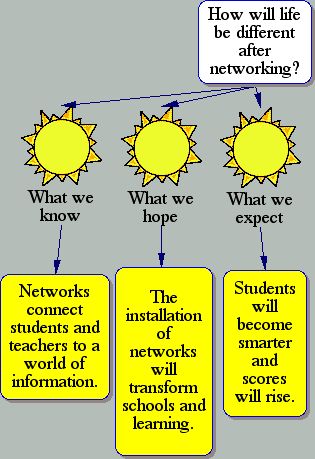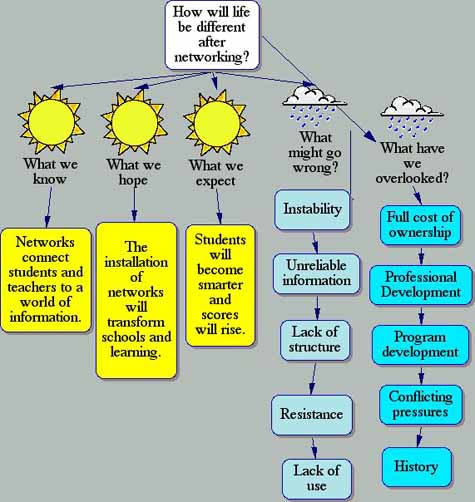| Research Cycle |
|
|
| Vol 1|No 2|September|2004 | |
|
Please feel free to e-mail this article to a friend, a principal, a parent, a colleague, a teacher librarian, a college professor, a poet, a magician, a vendor, an artist, a juggler, a student, a news reporter or anyone you think might enjoy it. Other transmissions and duplications not permitted. (See copyright statement below).
Truth rarely appears where we might look logically. The creation of new knowledge almost always requires some wandering off course. The more we cling to coastline, the less apt we are to find the New World. As Melville so dramatically pointed out in Moby Dick, the search for truth requires the courage to venture out and away from the familiar and the known. In his chapter on the Lee Shore, Melville comments . . .
Strategy One - The Jigsaw Puzzle, Juxtaposition, and Worst Case Scenarios We can use the jigsaw puzzle as a metaphor for this kind of thinking. Faced with a pile of a thousand landscape pieces, we hardly know where to begin, but after we gather edges and begin to fill in a few sections, what is missing begins taking form in contrast to what is found. Extend this metaphor to a cluster diagram. First we map what we know on the left side of a cluster diagram. We then create a matching set of empty boxes on the right as unknowns. Web definitions of juxtaposition. Making plans without paying attention to what might possibly go wrong is dangerous - the equivalent of wishful thinking.
Using the juxtaposition strategy, the diagram would be augmented to force consideration of disappointments and obstacles. The two columns on the right ask important questions.
Anticipating problems, obstacles and hurdles strengthens the planning process and reduces the chances of failure. The same planning process works well when bringing new technologies into schools, when hoping to transform the reading program of a school or when asking what steps need to be taken to increase homeland security. Some planners call this process scenario-building. The goal is to spin out an array of situations that might arise despite our best hopes and efforts - scenarios ranging from optimistic and provident to disastrous . Smart planners include at least one "worst case scenario" in their preparations so that they have strategies in mind to protect them against the dark side of life. Strategy Two - Reversal
Turn the issue, problem or challenge upside down and inside out. Take the issue, problem or challenge and spin it about to look at all the different angles. If black, look at the white or blue. Planning to install a new reading program? Consider removal of a reading program, a step usually overlooked when introducing something new. Introducing an after school program? Consider a morning substitute? Trying to cut down on the incidence of anti-social behaviors? Give thought to increasing the frequency of good deeds and good works? While each of these are a matter of words, semantics and emphasis, these mental frameworks can have a deciding impact on the way a challenge is approached and change is made. Strategy Three - Grab the Tail
Classic problem-solving strategies abound for those who are stuck in their planning. In all too many cases, we fixate on a few options and fail to invest adequately in spinning out options. We narrow choices too rapidly and then agonize over the resulting scarcity of possibilities. Many organizations rush to deal with symptoms of problems rather than root causes. Later they lament the failure of policy. Edward deBono preaches lateral thinking and out-of-the-box thinking as a way to capture the process of generating a richer array of choices. Likewise, Roger von Oech writes of unlocking mental locks that stand in the way of generating imaginative and novel solutions. The folk wisdom of grabbing the tail captures the essence of both. Strategy Four - Purposeful Wandering - Learning to Get Lost! Once we accept that we may not know what we do not know, the notion of getting lost takes on new meaning. We hope to leave our biases, our presumptions, our ignorance and our limitations behind as we step over the boundary lines and launch a voyage of discovery and exploration. We leave our comfort zone and strike out for parts unknown. We escape narrow, provincial thinking and open our minds to the full range of human possibilities. We set ideology behind and give full consideration to what might be true. Hundreds of years ago, the journey might have been by canoe or sailing vessel. The explorers ventured into uncharted waters. Today it might be more a matter of exploring ideas. Sometimes we can take advantage of digital tools to expand our understanding. A thesaurus will point out linkages and associations we might not have anticipated, for example. The Visual Thesaurus at www.visualthesaurus.com/ provides a particularly vivid example of this exploration process. The visitor to this site follows trails and linkages that evolve like pathways through a magic forest.
Search engines may also support purposeful wandering in powerful ways. TEOMA.com provides linkages and associated search options that the user might not have considered. Look up the term "discovery" on TEOMA and along with the usual list of web pages, it will suggest other searches:
Programs like these help thinkers to tap into resources they might not have otherwise considered. Strategy Five - Theater of the Absurd and Beyond the Pale While it would be nice if the world, human behavior and the nature of life were all logical, reasonable and sensible, much is irrational and very strange. Logical and sensible people sometimes have difficulty thinking illogically, so they are limited in their ability to contend with illogical forces, extremists and highly emotional opponents. Playrights like Samuel Beckett, Eugene Ionesco, Jean Genet and Harold Pinter coined the term in the 1950s. Planners who limit their thinking and their reading to like-minded thinkers and planners are unlikely to understand the thinking of irrational opponents, insurgents, seers, prophets and demagogues. Unpleasant as it might seem, we must all extend our reading, our listening and our thinking to penetrate the veils and walls surrounding the dreams, wishes, lies, plans and strategies of those who live, think, operate and act beyond the pale. (Derivation) If we never read what dissidents and radicals are writing and thinking, we are likely to wake up to unthinkable headlines when they take actions that seem horrific. If we surround ourselves with true believers of our own faith, we may make very poor chess players when face to face with those of different persuasions. To avoid horrific surprises, we must extend our definitions of intelligence to include the search for radical, the absurd and the illogical. Rather than suppressing all media that lie beyond the pale, we might sometimes pay attention to some of the laments, the threats and the rallying cries. Counter insurgency without deep knowledge of an opponent is a good example of theater of the absurd posing as rational policy. Strategy Six - Taking Soundings and Mapping the Unknown Long before Captain James Cook appeared on the scene, Pacific islanders had been sailing hundreds of miles of open ocean between islands using quite complicated navigational systems to find their way. Relying upon constellations, currents and many natural clues, they were able to travel far and still find their way home. Captain Cook devoted much of his career to carefully charting on paper those regions of the world that had not yet been charted (in European terms). With his collection of charts drawn by other European explorers and the help of Pacific islanders, he set about filling in the missing regions by sailing into them to see if there were land forms worthy of charting. When sailing into a harbor unknown to Europeans, a member of his crew routinely used a lead to take soundings (judge the depth of the water). These were added to the chart as one more measure of the world being described. The construction of knowledge and especially the discovery of new ideas and possibilities must also proceed by venturing, sounding and mapping.
|
|
Back to September Cover
Credits: The photographs were shot by Jamie McKenzie . Copyright Policy: Materials published in The Question Mark may be duplicated in hard copy format if unchanged in format and content for educational, nonprofit school district and university use only and may also be sent from person to person by email. This copyright statement must be included. All other uses, transmissions and duplications are prohibited unless permission is granted expressly. Showing these pages remotely through frames is not permitted. FNO Press is applying for formal copyright registration for articles. Unauthorized abridgements are illegal.
|
 The Question Mark
The Question Mark






